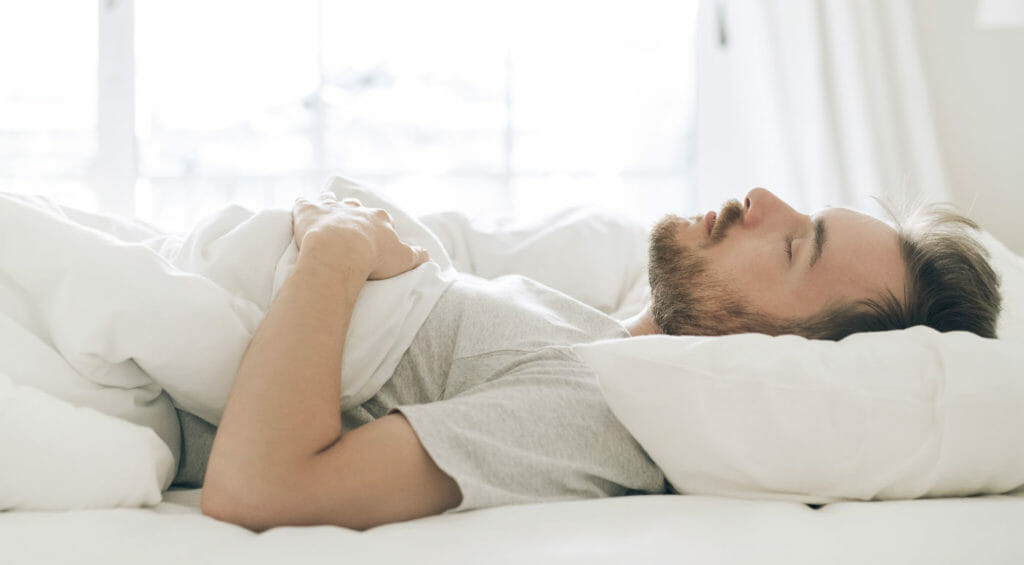

Do you wake up with back pain after a disrupted sleep? Or do you have trouble sleeping due to back pain, neck pain, or snoring? It could be because of the position you’re in when you sleep. Consider how you’ve been sleeping, and think about whether trying a new sleeping position could help you wake up feeling refreshed and comfortable.
What Happens If You Don’t Sleep Properly?
According to research, a lack of sleep greatly affects your performance and response time on tasks, particularly in terms of alertness, focus, and concentration. Some of the common symptoms of sleep deprivation include forgetfulness, caffeine dependence, junk food cravings, lethargy and tiredness, headaches, depression, anxiety, lack of sexual drive, and serious health issues like cardiac problems.
What Happens When You Get a Sound Sleep?
High-quality sleep is the foundation for a healthy, happy, and successful life. Sleep rejuvenates your brain so you can function at your best during the day. Sleep also improves your mood and ability to form and enhance relationships. Sleep boosts your immune system and supports a healthy appetite while helping you stay in shape.
Good sleep leads to:
- Better skin health and a more youthful appearance
- Emotional regeneration and better relationships
- Decreased risks for stroke and cardiovascular disease
- Fewer accidents
- Lower levels of inflammation
- Enhanced immune system function and lower risk of cancer and infection
- Hormonal balance
- Faster rate of weight loss
- Decreased pain
- Stronger bones
- Better memory and lower risks of Alzheimer’s disease and cognitive decline
- Longevity
Simply put, when you get adequate sleep, your life is better.
How Much Sleep Do You Need?
According to the National Institutes of Health, an adult requires 7 to 9 hours of sleep each day. The National Sleep Foundation further explains that different age groups each need a different amount of sleep:
| AGE | Hours needed |
|---|---|
| Newborn to 3 months old | 14–17 hours |
| 4 to 11 months old | 12–15 hours |
| 1 to 2 years old | 11–14 hours |
| 3 to 5 years old | 10–13 hours |
| 6 to 13 years old | 9–11 hours |
| 14 to 17 years old | 8–10 hours |
| Young adult (18 to 25 years old) | 7–9 hours |
| Adult (26 to 64 years old) | 7–9 hours |
| Older adult (65+) | 7–8 hours |
Inappropriate sleeping positions can drastically affect your chances of getting these correct amounts of sleep, and if you keep sleeping in the wrong position, your sleep deprivation can become chronic. So, it’s a good idea to find your ideal sleeping position to improve the quality and quantity of your sleep. Lifestyle changes including changing sleeping positions are the first steps in solving your sleep problems.
How Does Your Sleeping Position Affect Your Sleep?

Your sleeping position affects many aspects of your sleep and rest. Quality sleep is impossible without the right position to promote the body’s ability to rest and recover. Inappropriate posture may lead to back pain or worsen already existing back pain. The wrong sleeping position can put extra stress on your hips, back, or neck. One study found that shoulder pain could be treated by changing the sleeping posture. So your sleeping position plays an integral part in supporting healthy sleep.
Finding the Best Sleeping Position
The best sleeping position is not one-size-fits-all. You might find that you tend to favor a certain position. You might also never have thought of your sleeping position, since it feels natural and automatic for you to lie in a certain way. But it’s worth considering so you can get the best possible sleep. Think about your current needs and challenges, such as pregnancy, back pain, neck pain, or injury recovery, to determine the best sleeping position for you.
The Best Sleeping Position for Your Back
Maintaining the integrity of your spine during sleep is integral for optimal sleep. According to sleep.org, sleeping on your back is the least preferred position to sleep in, yet it is the most effective one. It allows your neck, spine, and head to rest in a neutral position. Sleeping on your back also prevents any extra pressure on any specific part of the body, which helps prevent facial wrinkles and lessens the likelihood of acid reflux.
Considerations When Sleeping on Your Back
According to a 2017 study, sleeping on your back can increase snoring, especially if you have more than average amounts of body fat around your throat. When you sleep on your back, gravity can force the base of the tongue to collapse into the airway, causing the throat to close and obstructing normal breathing patterns. Losing body fat and adopting a different position can help.
Don’t Make These Mistakes:
Sleeping on a Worn-Out Mattress
You need support and comfort to maintain your spine’s proper alignment. An old, saggy mattress that lets your hips sink interferes with your natural spine curvature and leads to poor rest. To achieve the right sleeping position, you need a supportive mattress. If you’re in need of a new mattress, make sure to check out our ranking of the Best Online Mattresses. Or, if you’re having back pain, take a look at the Best Mattresses for Back Pain.
Using Big Pillows
Pillows are not always a source of comfort. Having a large pillow under your head while lying on your back can misalign your spine. You can end up with neck pain, back pain, and headaches. Just like choosing a mattress, take your time to ensure your pillow provides the right comfort and support for your current needs.

Sleeping on Your Back While Pregnant
Various studies have shown that sleeping on the back increases compression against a major blood vessel, the vena cava, which compromises blood flow. On the contrary, side sleeping promotes blood flow, which allows better delivery of oxygen and nutrients to the fetus. Placing a long pillow behind your back can help remind you not to sleep on your back, and keep you from rolling over in the night.
The Best Sleeping Position for Your Brain
While you sleep, cerebrospinal fluid flows between your brain cells to remove toxins and wastes that accumulate as a result of day-to-day brain use. Nightly removal of these toxins is important to prevent neurological impairment: a 2018 study found that beta amyloid proteins are a major factor in the development of Alzheimer’s disease. A recent study published in the Journal of Neural Science found that sleeping on the side promoted this flow of CSF in rodents, which means it might be the best position to help prevent neurological disease.
The Best Sleeping Positions for Sleep Apnea and Snoring
Sleeping on Your Side
Sleeping on your side prevents your tongue and throat tissues from collapsing and partially blocking your airway. Sleeping on your left side can help alleviate digestive problems such as acid reflux. If you have hip or knee problems, you can put a pillow between your knees for added comfort. This position is also best for pregnant women, as it promotes blood flow.
Avoid These Mistakes When Sleeping on Your Side:
Leaning on Your Shoulder
Most side sleepers experience numbness in their shoulders due to leaning on the arm for too long. Lying on one arm all night cuts off blood circulation and nerve function, and you might wake up feeling sore and stiff. Instead of sleeping with your shoulder directly under your body, move your shoulder forward slightly to avoid hurting your shoulder and arm muscles.
Not Supporting Your Spine
If you sleep with your head propped up too high on the pillow, you can compromise your spine. If you have a history of back pain, you can use a pillow to stabilize your spine and alleviate pressure from your hips and lower back. It’s also important to ensure you have the right mattress and pillow to get the support and comfort your body needs for optimal rest. A mattress topper can also help for those who aren’t ready to invest in a new mattress.
Three Reasons to Avoid Sleeping on Your Stomach

Excessive Curvature of Your Spine
Sleeping on your stomach causes excessive curvature of your spine, leading to nerve irritation which can result in lower back pain and discomfort. Even if you have been sleeping on your stomach for a long time, change is possible with practice. You will retrain your muscles to like other safer positions, and in the long run, you’ll sleep better.
Neck Pain
When you sleep on your stomach, you are automatically turning your head 45 degrees. This turnpulls on your neck muscles, preventing proper relaxation and leading to neck pain and headaches. It is never too late to adopt a better sleeping position.
Breathing
When you sleep on your stomach, you compress your chest and ribs. Consequently, you are not able to fully expand your chest as you breathe, so you might not fully oxygenate your blood throughout the night.
No one sleeping position is best for everyone — it’s about figuring out what your body needs for optional rest. But while some sleep issues might require you to make an appointment with a professional, you can modify and experiment with your sleeping position anytime. If you have tried changing positions and still have trouble sleeping, please seek assistance from a qualified healthcare provider.